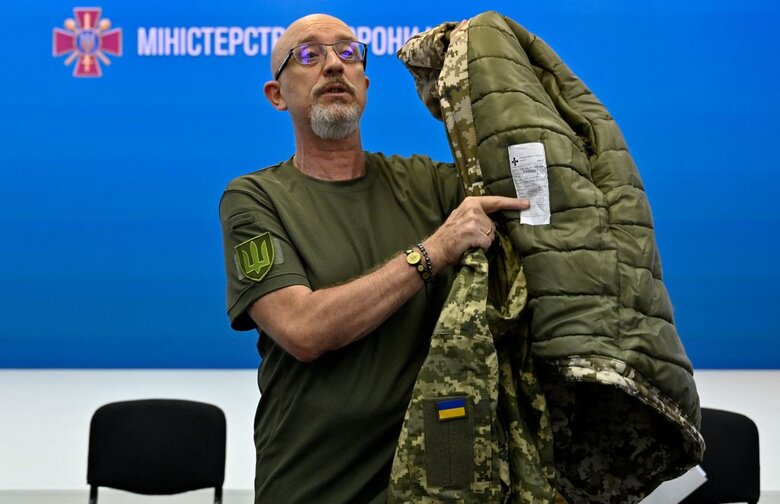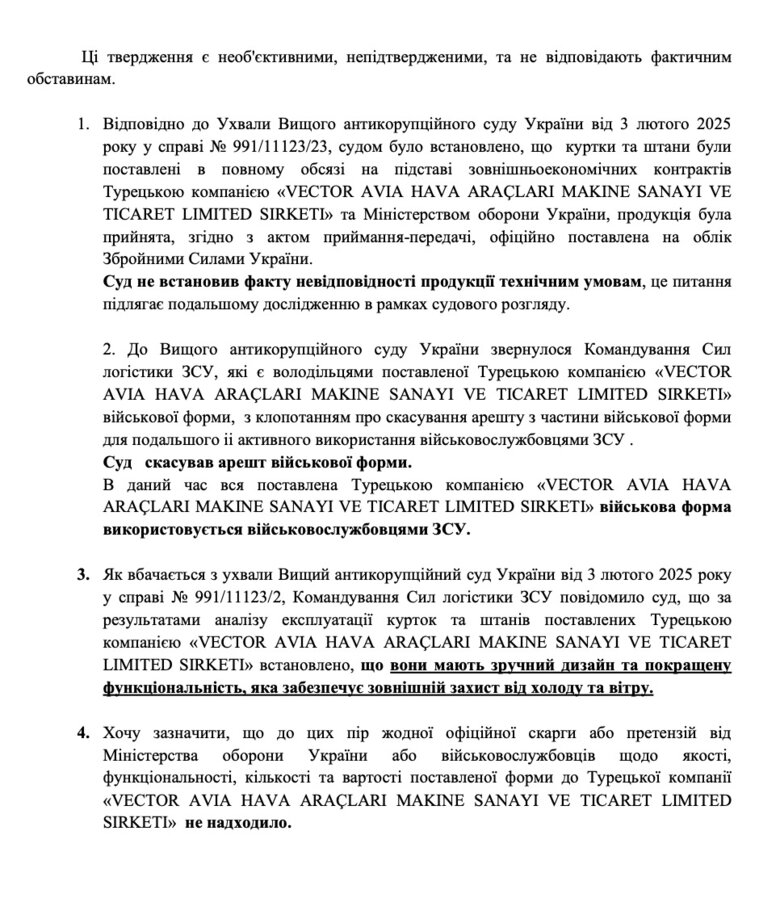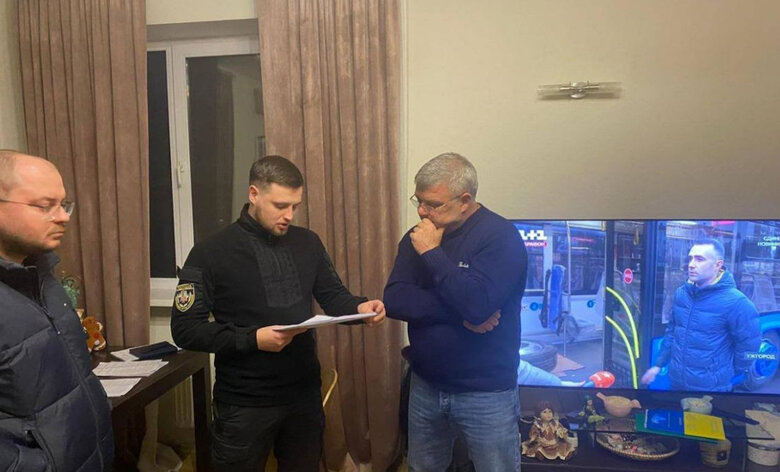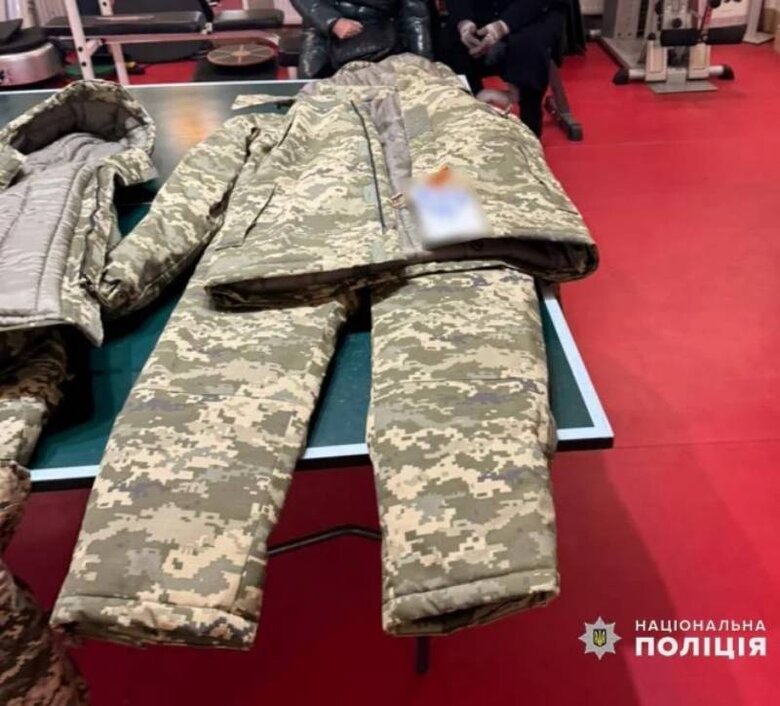Defence indulgences: how persons involved in Reznikov-era scandals might get off scot-free
The bill on so-called defense indulgences has not yet been considered, but some figures involved in scandals surrounding the Ministry of Defense procurement are already trying to resolve their legal issues.
The past week was marked by several developments in cases related to uniform procurement, including the Turkish jackets that played a role in Minister Reznikov’s dismissal, as well as a scheme involving overpriced supplies implicating former Ministry of Defense advisers and international intermediaries.
Another case involves an adviser to Reznikov’s deputy, who was also accused of orchestrating a criminal scheme to earn $10 million from supplying Turkish jackets to the Ministry of Defense.
Let’s start with Reznikov’s jackets. The scandal began in summer 2023, when journalist Yurii Nikolov published an article revealing that the Ministry of Defense purchased summer jackets at winter jacket prices. The jackets turned out not to be summer ones, but clearly failed to meet the technical specifications.
Following the delivery, several criminal investigations were opened. Among other findings, it was noted that the jackets did not comply with either the technical requirements for that type of jacket or the specifications set out in the contract.
On August 24, 2023, during a meeting of the Public Anti-Corruption Council (PAC) with Ministry of Defense representatives, the circumstances of the contract award were discussed. Despite the genuinely difficult situation the Ministry of Defense faced at that time, no one was able to explain how this particular Turkish supplier was selected.
At the same meeting, the PAC received two jackets and permission to visit the warehouses of a military unit where the remaining jackets were stored.
In September, three PAC representatives visited the warehouse and observed that the jackets differed in color and stitching of materials (potentially indicating they were sewn in different mini-workshops) and that some did not match the specified sizes.
A few weeks later, the two jackets were submitted for examination to Ukrmetrstandart. During a superficial inspection, the lining of one jacket began to unravel simply when handled.
The examination established that the jackets did not meet the specifications of either the 2016 or 2023 technical conditions, nor the contract requirements, which stipulated that the jackets should withstand temperatures as low as minus 20 degrees Celsius.
However, a few days ago, the owner of the company, Roman Pletnyov, sent a letter to Censor.NET demanding the removal of "false information" about the jackets from the website.
"The information disseminated in the aforementioned article is false and discredits my personal business reputation and that of the Turkish company VECTOR AVIA HAVA ARAÇLARI MAKİNE SANAYİ VE TİCARET LIMITED ŞİRKETİ, misleading the public regarding the quality and cost of the products supplied," Pletnov stated.
According to him, the contracts concluded with the Ministry of Defense of Ukraine were fully executed by the Turkish company VECTOR AVIA HAVA ARAÇLARI MAKİNE SANAYİ VE TİCARET LIMITED ŞİRKETİ in accordance with their terms.
"At present, all military uniforms supplied by the Turkish company VECTOR AVIA HAVA ARAÇLARI MAKİNE SANAYİ VE TİCARET LIMITED ŞİRKETİ have been in active use by Armed Forces personnel for the third consecutive year," Pletnov emphasized.
"No claims or complaints regarding the quality, quantity, or cost of the supplied military uniforms have been received from the Ministry of Defense of Ukraine, military units, or Armed Forces servicemembers either against the Turkish company or myself personally," he assured.
At the same time, Pletnov reported that the seizure of the jackets was lifted by the High Anti-Corruption Court, and the court did not establish any fact of non-compliance of the products with technical specifications. However, "this matter is subject to further investigation within the framework of the court proceedings."
So, two years after the scandal, the issue has almost faded from view, and Pletnov’s company may return to supplying the Ministry of Defense. Victory!
Case 2 is no less interesting. This week, the court reduced the bail for Roman Balykin, former adviser to the ex-Deputy Minister of Defense of Ukraine and one of the suspects in the case of embezzlement related to the purchase of uniforms for the Armed Forces, from 136 million hryvnias to 9,992,400 hryvnias.
In November 2024, the National Police reported that they had exposed an adviser to the former defence minister and a former People`s Deputy who "colluded to misappropriate budget funds by ordering over a million sets of clothing for Ukrainian servicemembers."
According to a source from law enforcement cited by Hromadske, the case involves businessman Roman Balykin, former People`s Deputy Ihor Franchuk, and his son Yaroslav.
Media sources indicate that an intermediary company concluded five contracts with the defense ministry worth over $35 million, while the Turkish side claimed that supplying the uniforms would actually cost $10 million less. Evidence supporting this version is contained in the court decision registry.
The very next day, the American company Sinclair & Wilde accused the National Police of Ukraine and the Ministry of Defense of corruption and extortion. They also claimed that Ukrainian officials refused to pay the American company under the military uniform supply contract, demanding a kickback.
"Sinclair & Wilde categorically denies the false and baseless statements made in the recently released video by the National Police of Ukraine. It is clear that the publication of this story is an attempt by the National Police to cover up their own internal corruption and the corruption within the Ministry of Defense of Ukraine, arising from its prolonged efforts to withhold payment to Sinclair & Wilde after the company repeatedly refused to pay demanded bribes," the company stated in an open letter at the time.
"Throughout 2023, several individuals, including those involved in American and Ukrainian investigations, demanded bribes from Sinclair & Wilde to secure the payment of the remaining $14.5 million owed to the company. Sinclair & Wilde refused and reported these demands to authorities in both the United States and Ukraine. In compliance with the laws of both countries, Sinclair & Wilde alerted the U.S. Embassy in Kyiv, U.S. law enforcement, and Ukrainian authorities to the extortion attempts and apparent corruption within the Ministry of Defense of Ukraine more than a year ago," the company declared.
According to sources cited by Censor.NET, the investigation established that, in order to embezzle budget funds when ordering over 1,000,000 sets of clothing, former advisor to the ex-Deputy Minister of Defense Roman Balykin conspired with former parliamentarian of the II-IV convocations Ihor Franchuk and an international fraudster, Solomon Philip (a citizen of Israel, France, and Guinea), who has repeatedly faced criminal charges in France, Spain, Turkey, and Indonesia and in order to fulfill the order, he selected the textile holding Barer Corporate (Turkey) and promised its management assistance in securing a large defense contract through his connections with influential Ukrainian officials and politicians. The scheme also involves the son of a former People`s Deputy, Yaroslav Franchuk, and current Ukrainian People`s Deputy Andrii Lopushanskyi.
"Solomon Philip concluded five contracts with the Ministry of Defense of Ukraine at inflated prices totaling USD 35 million on behalf of a company under his control, while the actual cost of performing the work was USD 25.6 million. The excess amount of over USD 10 million from the procurement cost was planned to be divided among all participants of the criminal scheme, including former officials of the defense ministry," the documents available to the publication state.
Among other evidence, the investigation possesses excerpts of correspondence proving the existence of the criminal scheme.
For example, one of the excerpts reads: "If any supplier sees the price at which they sell and the price at which we buy from them, they will not agree. And if they do agree, we cannot be sure they will pay on time. SW is a legal American company owned by my daughter Anastasiia, a US citizen. I don’t need that tiny percentage left for SW to survive, but I believe we can do big things."
Another excerpt of the correspondence could serve as evidence that the entire top leadership of the ministry might have been aware of the scheme. At least, the case figure assures his interlocutor that he has excellent contacts with all the ministry’s leadership.
"Hello. No, don’t agree until everything is delivered and paid for, nothing can be done. And when we meet, we will discuss Reznikov and so on, because I have information about the real situation from the very top. Please, my friend, don’t be impatient and don’t handle the accounting while the work is not finished yet, and there are still many problems caused by false accusations against Roman (Balykin), which created difficulties. I now have the full reality and truth about everything. What really happened, what was really said, and what is really true about Roman, Shapovalov, Reznikov, and Andrii, I know now. I know where all our difficulties came from."
From other correspondences, it becomes clear that the case figures attempted to take ownership of the supplier company, similar to the "Lviv Arsenal" case.
Equally interesting, and perhaps even amusing, are the episodes where the Ukrainian side begins to suspect that they have been deceived by their foreign partners.
"Did you split the $1 million? If you remember, it was 50/50 between us. You asked for $200,000 for Anastasiia, you don’t understand the risk Yaroslav is facing now."
"I want to see all expenses related to the contract (bank statements of transfers, of course)," the correspondence reads.
The author publishes these materials because this case might disappear, as others have before.
The mentioned individuals, of course, may provide their comments.
However, even the published fragments seem sufficient to understand why a draft law has appeared in parliament aimed at effectively removing criminal liability from those involved in schemes within the defense sector.
Tetiana Nikolaienko, Censor. NET






